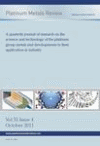-
oa Rhodium Bicentenary Competition
- Source: Platinum Metals Review, Volume 46, Issue 1, Jan 2002, p. 2 - 2
-
- 01 Jan 2002
Preview this article:






Rhodium Bicentenary Competition, Page 1 of 1
< Previous page Next page > /docserver/preview/fulltext/pmr/46/1/pmr0046-0002-1.gif
There is no abstract available.
© Johnson Matthey


